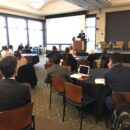Recognition Process Ecuador
![]() Ecuador
Ecuador
Legal Framework
Constitution of the Republic of Ecuador
Institutional actors and operational instances
The National Secretariat of Higher Education, Science, Technology and Innovation (SENESCYT)
Documentation required in order to initiate the recognition process
Application for recognition: all applications for recognition of professional qualifications or an academic degree obtained in foreign higher education institutions must be submitted to SENESCYT.
General requirements for the application for recognition of professional qualifications or academic degrees:
1. Physical presentation of the citizenship card or copy of the passport or refugee card in the case of foreigners.
2. Physical presentation of the original degree.
3. Presentation of a certificate and/or documents that allow verifying the period of studies, its modality and the description of the same.
4. Presentation of a copy of the thesis or its equivalent, in magnetic media and editable format; and, certificate of accreditation or its equivalent from the foreign institution and/or the program, for Doctorate degrees -PhD- or its equivalent. Documents issued abroad must be submitted with the respective legalization and/or apostille.
Contact
Address: Alpallana y Martín Carrión, Quito Ecuador Telephone: 593 2 399 0400
To support ratification in Ecuador, please write to:
Secretary of Higher Education, Science, Technology and Innovation: Sec. Agustín Albán Maldonado
https://twitter.com/EduSuperiorEc
https://twitter.com/agustinalbanm
President of the National Assembly: Ing. César Litardo Caicedo
RELATED ITEMS


